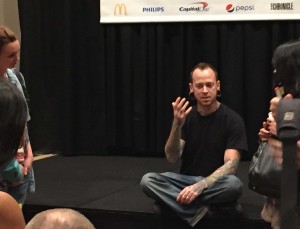 “Where do great products come from?”
“Where do great products come from?”
This was one of the first questions Jon Kolko, the Founder and Director of the Austin Center for Design and Vice President of Consumer Design at Blackboard, asked the audience at his Friday-morning SXSW Interactive panel, Well-Designed: Creating Empathy Driven Products.
“Is it vision? Process? Or just hard work?” He continued his questions.
Kolko might actually know the answer, if there is one.
His resume includes extensive experience with Fortune 500 firms as well as successful work with startups. He has also written four books that span in subject matter the range of skills he has utilized in his career, Thoughts on Interaction Design, Exposing the Magic of Design: A Practitioner’s Guide to the Methods and Theory of Synthesis, Wicked Problems: Problems Worth Solving and Well Designed: How to use Empathy to Create Products People Love.
Kolko’s passion, though, has been in the back-end thought processes that drive good design, whether of apps, sites, or even just ideas.
His most recent startup venture channeled that passion into the humanization of educational technology and career-focused social media.
MyEdu, which was last year acquired by Blackboard, offers an alternative to LinkedIn that is more suited to young students. The company also offers tools to help students make the most of their time at school and empathy-driven tips to help students understand what recruiters and employers are actually looking for.
Kolko said, when speaking to students, he would hear that LinkedIn made them feel, “like an idiot.”
“It says I started school…but that’s it. I haven’t finished yet.”
While he knew that something needed to change in the online pathways available to students to present themselves to employers, Kolko pressed the concept of empathy throughout his panel. He repeated again and again that understanding the actual experience of the users they hoped to work with was crucial to their design.
In this pursuit Kolko and his MyEdu team spent long hours talking to students and spending time with them throughout their day.
It was a challenge to get in contact with students willing to endure such focus, he added.
“You can’t just walk into a kid’s dorm room and say, ‘Hey, I’m going to watch you now,'” he said laughing.
The insight the team gained through spending time with students was invaluable. They learned that it wasn’t just that they needed a new platform more suited to their age or experience levels – there was a fundamental disconnect between what students were presenting and what recruiters and employers were looking for.
Kolko shared several remarkable quotes from student interviews, one being from a 21-year-old business major named Samantha:
“Everyone has a business degree these days, so I’ll always be able to get a job. I found out about the international business major from a guy at The Gap. I didn’t even know what it was. I Googled it, and it sounded better than just regular business, so I just chose that. My life decisions are based on stupid things.”
Although there was some appreciation of the quote on a comical level within the panel audience, Kolko stressed that he wasn’t sharing this to get a laugh.
“I didn’t put this here to ridicule Samantha or any other student but to say: This is who we need to be designing education for.”
MyEdu’s mission became to help students identify their skills and present them to employers in a credible way. They have worked toward this by building an interactive social-media-style interface where students add graphics to their page to represent their skill sets and interests. They’ve also spent a great deal of time working with students to help identify what they can present as a skill and how best to talk about those items.
At the heart of MyEdu and any other product development process, Kolko maintains, should be a genuine sense of empathy for your audience, your customer.
“[You have to] find out what people are doing wrong. What is the problem? [Then you have to ask] why are they doing that?”
Kolko told the panel Friday that if you can do that, you can start to find the solution.
